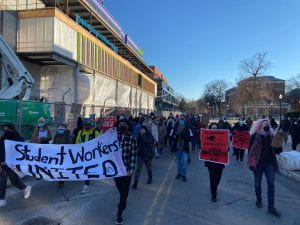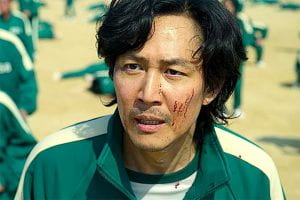
If students cannot rely on their university to pay them a living wage and provide good working conditions, what do they do? This is the question many student workers are asking themselves at Ohio State. While tuition, housing, food, and transportation costs continue to rise, wages for student workers employed by Ohio State remain stagnant. It is apparent to them that it is time to fight back.
On Friday January 21st, in collaboration with student workers, Students for a Democratic Society at Ohio State (SDSOSU) and Young Democratic Socialists at Ohio State (YDSOSU) held a protest to raise demands towards the university that student workers desperately need. They included a $15 an hour minimum wage, free parking for student workers, paid sick leave, holiday pay, more frequent and higher raises, and higher work hour limits for international and DACA (a federal program to protect immigrant youth from deportation) students.
The main theme of the demonstration was the fight for a $15 minimum wage. According to a pamphlet the SDS distributed “most student workers are paid anywhere from $9.30/hr (as of 2022) to $12/hr, with the majority being at or below $10/hr”. Furthermore, it says “during 2020-2021… OSU had an exceptionally strong financial year with an increase in its gains to $2.961 billion”. It is extremely clear that OSU has enough money for the demands. Not only that, but there is no way that they do not realize that students are struggling to live on their starvation wages.
One student worker and organizer that I talked to was Jacob Messman. I asked him what a $15 minimum wage would mean for him. He said that “I’d be able to support myself regardless of whether I choose to live on-campus or off-campus… I’d be able to pay bills, buy groceries, rely less on my inadequate university meal plan, spend more money on myself… I can’t do that with $9.30 an hour”.
Further, Messman also responded to university spokesperson Ben Johnson’s recent statement seen in an article in the Columbus Dispatch by Sheridan Hendrix that “the university offers competitive salaries and benefits to retain and support our critical student employees, and we value their contributions to our campus life and land grant mission”.
Messman said he’s tired of hearing that script. “Of course that’s their response. They have no interest in paying their students a living wage…to call their wages and benefits competitive is ludicrous”.
One key aspect that often gets missed in this discourse is that most student workers not only cannot afford to live on these wages, but they are also simultaneously going deep into debt to pay for their education.
The last time the federal minimum wage was increased was in 2009, ($7.25/hr). According to the OSU website, in the academic year 2009-2010, “typical undergraduate resident fees for Columbus Campus students [was $18,695.]” It is now 2022 and these costs look quite different. This year the website says an incoming first-year student under the same circumstances can expect to pay $25,288. That is about a 35% increase in cost. Since then, the minimum wage in Ohio has only increased from $7.30 an hour to $9.30 an hour.
According to the MIT Living Wage Calculator, someone working full time and living by themselves in Franklin County needs to earn at least $14.12 an hour to make a living wage. Most student workers are part-time simply because they do not have time as students to work full-time. How can students expect to get by on poverty wages as a student, while racking up thousands of dollars in debt?
Something must change; students are increasingly finding it harder and harder to get by. It is not sustainable to rely on the state or the federal government to raise the minimum wage. The university must act if they want students to feel comfortable while going to school. Enough is enough; it is time for the university to set a $15 minimum wage and meet all the demands of the protesters.
This article was originally published in the Columbus Free Press and cross published with permission.
